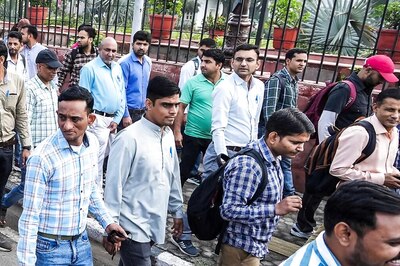
views
New Delhi: Lobsang Sangay, the political successor to the Dalai Lama, was sworn-in as Prime Minister of the Tibetan government-in-exile at a public ceremony in Dharamsala on Monday.
43-year-old Sangay administered the oath of office at a ceremony in the central courtyard of the main Tibetan temple, opposite to the office of the Dalai Lama.
Sangay succeeds Samdhong Rinpoche as the Kalon Tripa or the Prime Minister of the Central Tibetan Administration. The oath was administered by Ngawang Phelgyal, the Chief Justice Commissioner, in the presence of the spiritual leader of Tibetans, the Dalai Lama.
Sangay is the first to take charge of the office after the Dalai Lama announced his decision to devolve his political authority to the elected leadership. These changes were ratified by the Tibetan Parliament in May.
Born in Darjeeling and educated in Delhi, Sangay pursued higher studies in the US and was a senior Fellow at the Harvard Law School before being elected as the Kalon Tripa in April.
Besides pursuing law, he also organised conferences and seminars which were attended by several Chinese scholars during his 16-year stay in the US.
He believes that it will be hard for the Chinese to criticise his ascendance to the post as August 8 is considered as auspicious by them.
In a recent interview, the Tibetan leader pointed out that the Beijing Olympics were also launched on August 8, 2008 (8/8/8), an auspicious day according to Chinese beliefs.
Asked about reaching out to the Chinese leadership to find a solution to the Tibet issue, Sangay said he was willing to meet his Chinese counterpart "anytime, anywhere" but said there was lack of reciprocity from Beijing.
"I am willing to meet with my Chinese counterpart anytime, anywhere. The issue has always been the lack of reciprocity," he said.
On his priorities during his five-year term as Prime Minister, Sangay said he would strive to restore freedom for Tibetans and try and ensure the return of the Dalai Lama to Tibet.
Striking a more realistic note, he said laying a foundation for a stronger and sustainable Tibetan movement for the next 50 years would be a priority.
"Keeping the Tibet issue alive and creating awareness at the international level is very important," he said. On the domestic front, Sangay's thrust will be on improving the education of Tibetans in exile.
"I want Tibetans to improve on Maths, Science and English language. That would make them get good jobs and help them emerge as effective leaders of the community," he said.
The Chinese delegates settled in America and Australia are also likely to attend the oath taking ceremony, Thubten Samphel, a spokesperson for the Tibetan government-in-exile, said.
Lobsang Wangyal, whose initiative to organise 'Miss Tibet' pageant was disapproved by the Dalai Lama, said he was happy that the younger generation was coming forward to take up the leadership and hoped that the Tibetan struggle would acquire new dimensions under the new leadership.
The Prime Minister elect, Sangay said that with older generation fast ageing it was responsibility of young generation of Tibetans to carry the struggle forward and seek solution to the Tibetan problem.
He said that freeing Tibet and ensuring return of the Dalai Lama to his birth place was top on his agenda and he would create awareness about the Tibet issue at all international fora.
"My role is not to replace His Holiness but to fulfil his vision of a secular democratic society and live up to his expectation to strengthen the Tibetan movement to stand on its own feet," he said.




















Comments
0 comment